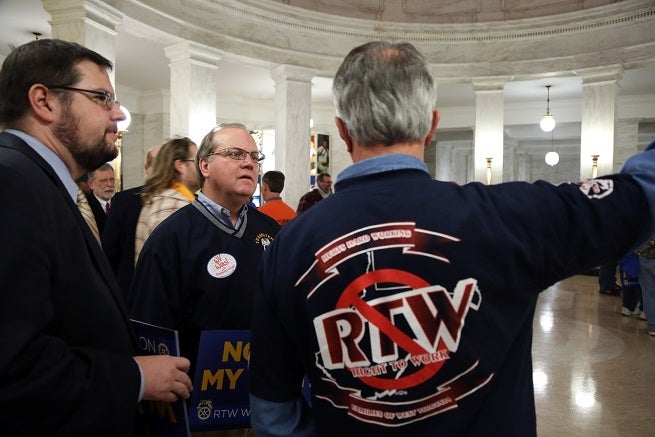Uncategorized
Koch-backed W.Va. Senate leader leads anti-worker push

(Paul Nyden, a long-time West Virginia labor reporter, will occasionally be contributing to the Teamster Nation blog about issues before the state’s Legislature. His latest report follows.)
CHARLESTON, W.Va. — By next week, both houses of the West Virginia Legislature are likely to have passed a right-to-work law and a second law eliminating prevailing wages. That law, on paying construction workers, has been in effect in the Mountain State since 1933.
“It is clear that they are railroading these bills,” said Steve White, executive director of the Affiliated Construction Trades Foundation, on Monday.
Prevailing wage legislation will probably be up for final passage in the Senate on Friday, White said, while so-called right-to-work (RTW) legislation is likely to be passed by the House of Delegates on Thursday.
The Senate previously passed right-to-work legislation and the House previously passed prevailing wage legislation.
The two new laws will then go to Gov. Earl Ray Tomblin (D), who has five days to consider whether or not to veto them. Tomblin has already said he will veto any right-to-work law that is passed.
But in West Virginia, a governor’s veto can be overridden by a simple majority, not a super-majority, vote. Both houses have Republican majorities.
White criticized advocates of the legislation for citing weak research and statistics in its support.
“When the prevailing wage law was in a Senate committee,” White said, “supporters of the prevailing wage asked for data proving that it costs taxpayers more.”
Sen. Craig Blair (R) denied the request, which was officially made by Sen. Ronald Miller (D).
Advocates of RTW have consistently argued, including during testimony before the Senate and the House, that companies thinking about moving facilities into West Virginia routinely ask if the state has a right-to-work law.
But U.S. Sen. Joe Manchin, D-W.Va., issued a statement on Friday, pointing out: “During my time as governor of West Virginia, and now your senator, I never had a single company tell me that it would relocate to our great state only if we would pass ‘right-to-work’ legislation.
“This is a partisan bill that will do nothing to create jobs in West Virginia,” Manchin said.
“The proponents of ‘right-to-work legislation are not able to show us the companies that will relocate to our great state if this legislation passes. Instead of engaging in divisive political fights, we should work together to bring successful companies to West Virginia,” Manchin said.
State Senate President Bill Cole (R), who operates car dealerships, is a strong supporter of both pieces of legislation.
On its website, the West Virginia AFL-CIO, pointed out that Walmart recently announced it will close 147 of its stores, 82 percent of which are in right-to-work states. After the closures, 10,000 workers will lose their jobs.
During the weekend, Cole travelled to Palm Springs, Calif., to meet with the billionaire Koch Brothers to raise money for his political campaign this year. Cole is currently running for governor of West Virginia.
Charles and David Koch have donated tens of millions to conservative political candidates and to universities around the country.
Bruttni McGuire, a state Democratic Party spokeswoman, said, “This is the latest example of Bill Cole doing what is best for Bill Cole – not the people of West Virginia.
“Senator Cole’s promises don’t mean much, because his agenda is all about helping himself. Instead of raising money in California, Cole needs to focus on doing his job in West Virginia. His promise not to campaign during the [legislative] session turned out to be just another Cole Lemon,” McGuire said.
White has been giving legislators fact sheets based on the ACT Foundation’s analysis about impacts repealing prevailing wages would have on the state and its residents.
Those facts include:
- Many local construction workers will be replaced by out-of-state workers employed by out-of-state contractors. ACT believes wages will decline between $51.3 million and $77.3 million annually.
- State income tax collections will fall between $3.1 million and $4.6 million annually, while sales tax collections will drop between $1.4 million and $2.1 million a year.
- Health insurance provided to construction workers now pays about $60 million a year to local hospitals throughout West Virginia. Repealing the prevailing wage and cutting union jobs would cut those payments to hospitals.
Ken Hall, president of Teamsters Local 175 in South Charleston and the union’s International Secretary-Treasurer, criticized a key study being used by Republican legislators to back up their proposed legislation.
John Deskins, an economics professor at West Virginia University’s College of Business and Economics, is the lead author of the study released in November, “The Economic Impact of Right to Work Policy in West Virginia.”
The Charles Koch Foundation and Ken Kendrick, a WVU business school graduate, donated $5 million to help create the Center for Free Enterprise as part of the College of Business and Economics, according to a February 2014 press release from WVU.
Hall said the Senate and House of Delegates each paid Deskins and the College $17,000 to fund that study, according to information released under the state’s Freedom of Information Act.